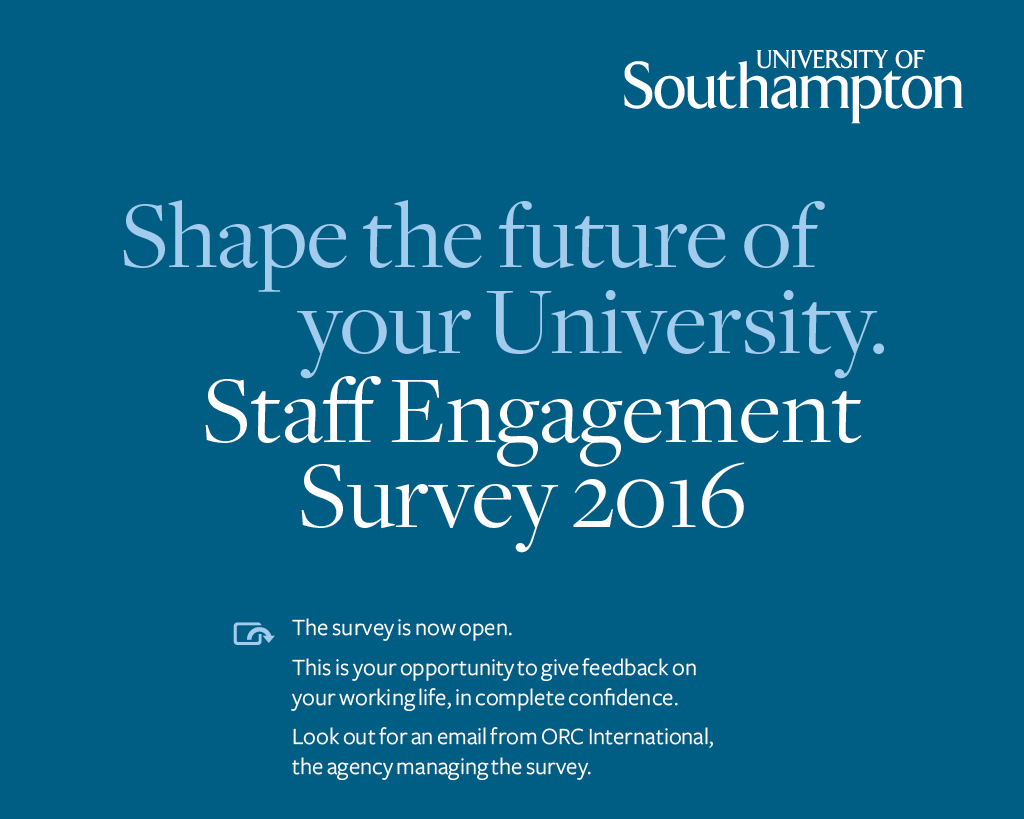Hartley News Online Your alumni and supporter magazine
Following the launch of the Staff Engagement Survey 2016 on 10 May, Southampton Connects talks to President and Vice-Chancellor Sir Christopher Snowden about the importance of your participation – to have your say and make a difference.
It’s called a staff engagement survey. Why is engagement important?
We need to be sure exactly how staff at the University view working here; how can we improve things if we don’t know what the major issues are? Equally, engagement will also highlight the areas we do well in, so we can focus on those in order to capitalise in these areas.
Why is it important for staff to fill in the survey?
We have over 6,200 staff working at the University, working in diverse environments and different roles. If we don’t actually get to hear what everybody thinks about their personal experiences we can’t hope to understand what improvements we need to make, how we are currently doing and basically what the issues are as people see them.
Filling in the staff survey is therefore really important. Hopefully people have gathered that I take staff engagement really seriously. I have read all of the comments from the last staff engagement survey and it has been very helpful to me to show me where I need to focus.
How does the survey help the University improve?
The Staff Engagement Survey helps the University improve in a number of ways. We now have a strategy with collegiality at its heart, which is all about people. So we need to have the input of the community to understand that. If we are going to work well, we need to be able to work well together. If there are staff issues we need to understand them and work together to solve them.
Why is it important to get a higher participation rate than the last survey?
The participation rate in the last survey was 54 per cent and this time we are ambitious in aiming for a participation rate of 75 per cent. The reason for this is so that we can get more value out of the survey.
In the last survey nearly half of colleagues didn’t respond which means the results weren’t statistically significant. So if we could get to a position where three quarters of staff respond in this survey, we can be pretty certain that the views are representative, allowing us to make informed changes. If participation is low, we might make changes that the vast majority of staff don’t support and that would be very disappointing.
The last survey was in 2014, what changes have been made as a result?
I understand that across the University there may be scepticism about the outcomes of these surveys and whether anything changes as a result. However, there has been real change. For example, following the survey it was clear that people were concerned about the leadership and management of the University. As a result, management and senior teams have taken part in a significant amount of training; I have been in several of the sessions and we are really getting to grips with issues raised in the last survey.
We have also put in place the Leadership Management Framework, which is aimed at refreshing and better defining how we manage. And we are seeking to improve the visibility of the leadership team – I hope that colleagues around the University feel that I am leading from the front in this regard. I think it is extremely important that as head of the institution I am hearing people’s views in person.
How can we get teams and departments around the University to put their own action plans together following the results of the survey?
One of the things that we do ask after one of these surveys is that teams and departments sit down together and map out how they will change. I do this too in my office, so it is done from the top down. If action plans aren’t drawn up it will make it harder – but not impossible – to make the changes we need to do.
How will the results of the survey help us achieve our strategic principles: sustainability, collegiality, internationalisation and quality?
First of all the issues around sustainability, collegiality, quality come out several times in the surveys themselves. Internationalisation quite understandably is mentioned a little less, but nevertheless it was by a few people.
More broadly though, the effectiveness of the University as a team is based on how we feel as individuals working here. If we are happy in what we do, we will do a better job. If you look more broadly at the sustainability and quality agenda it does relate to how well we deliver in our roles, so if people are happy here they will go the extra mile to help others succeed.
What is the role of survey champions?
We’ve nominated Survey Champions in as many departments and faculties as possible across the organisation. Their role will be to help with communication of the survey and encourage participation before and during the survey open period.
The idea of creating champions was to help us get to the 75 per cent participation level. It is very easy for us all to think that it is somebody else’s responsibility to answer the survey. The role of survey champions is to also help roll-out the survey and get a representative response across the whole institution, raise the profile of it, and heading-off some of the scepticism that may have emerged.
What is your vision following the results of the survey in a couple of years’ time – what would you like to see?
I am realistic about where we are starting from and I don’t necessarily expect it to be all positive, but I hope that in two years’ time we would see a greater sense of satisfaction about working at the University, that people are more comfortable with the management decisions being made, that we have listened to the points that were made in the survey, that we have made some changes and that people see the benefit in their working environment. In essence, I would hope that people see this as a great place to work and that we do listen to the comments from colleagues around our campuses.
How can you guarantee responses will be anonymous?
It is very important that people feel they are truly anonymous when making comments on the survey. We have run the survey itself through the ethics committees and it is specifically designed to be anonymous. And there is no way that we can track it back to individuals – everyone should feel quite comfortable with this. We also remove any names from the survey, which may appear in individual comments, before it is sampled, so absolute anonymity is guaranteed.
The Staff Engagement Survey 2016 is open until 24 May. Further information can be found on the Strategy SharePoint site. If you have any queries please email strategy@southampton.ac.uk.

